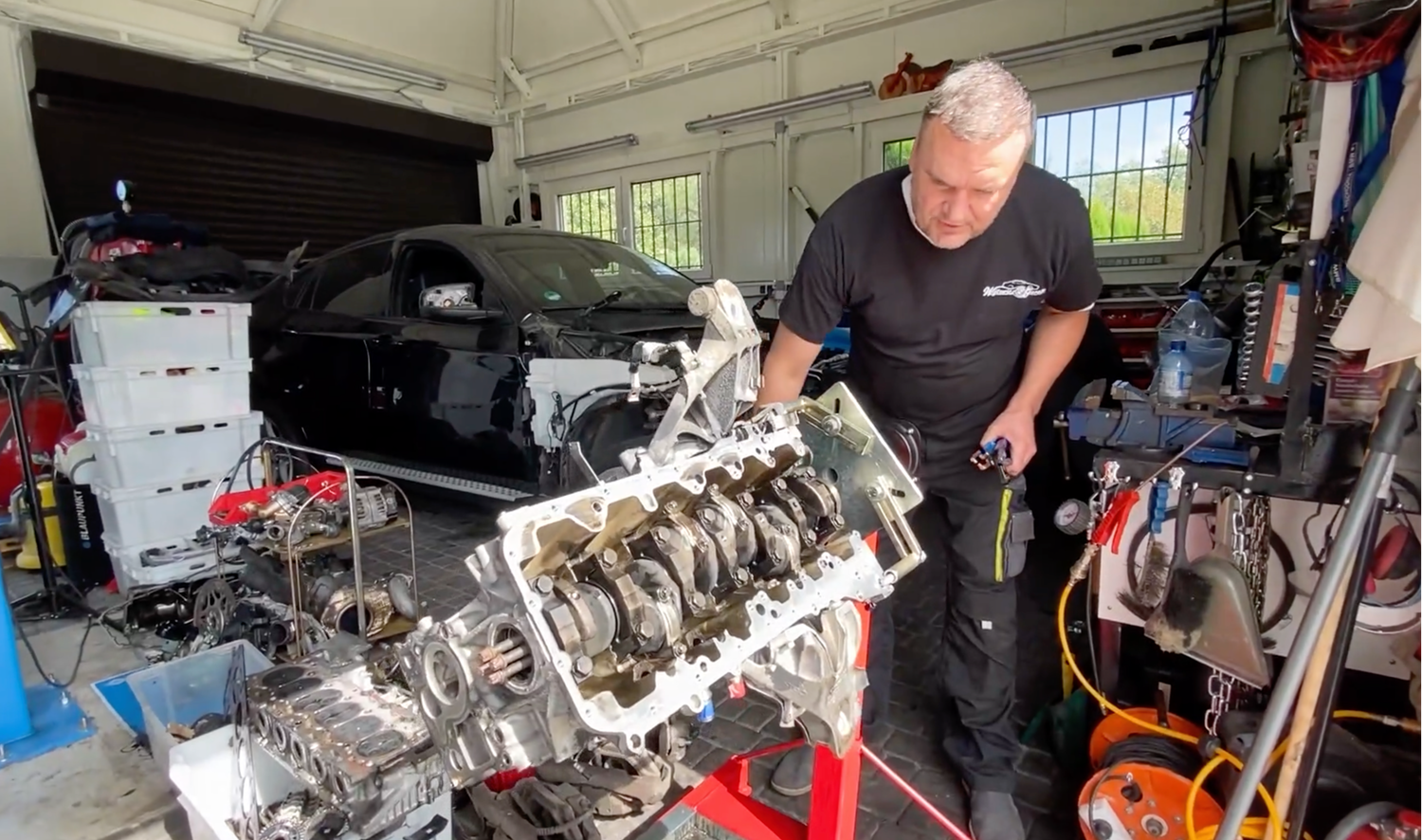Why Regular Oil Changes Are Not Enough — The Hidden Engine Threats Mechanics Don't Tell You![]()
The Myth: “Oil Changes Keep Your Engine Clean”
If someone told you that changing your oil every 5,000 miles (8,000 km) keeps your engine like new, politely smile — and don’t believe them. This well-spread myth costs drivers and fleet owners thousands in preventable engine repairs.
The truth? Oil changes only maintain lubrication. They do not remove harmful sludge, varnish, or carbon deposits that silently build up inside your engine.

This piston crown and cylinder wall show heavy carbon and varnish buildup — the result of long-term oil oxidation and combustion residue. These deposits reduce heat transfer, disturb compression, and may lead to sticking piston rings and oil burning. Regular oil changes can’t clean this. However, a professional engine flush like TEC 2000 — when added to the old oil — partially enters the combustion chamber and safely burns off during operation. Regular use helps dissolve and prevent the buildup of hard deposits like these, keeping the piston and rings cleaner over time.
What Oil Changes Miss: The Internal Enemies of Your Engine
Engine deposits form in areas where oil circulation is poor — piston ring lands, valve lifters, oil galleries. These residues reduce:
- Compression
- Fuel economy
- Turbo and injector lifespan
Hidden threats include:
- Sludge & varnish: Oxidised oil and fuel by-products that stick to engine internals.
- Carbon buildup: Found on pistons, valves and injector tips — disrupts combustion timing.
- Soot & DPF clogging (in diesels): Raises back pressure and shortens DPF life.
- Stuck piston rings: Causes oil burning (blue smoke) and power loss.

The Real Cost of Doing Nothing
- Injector reconditioning: $100–$400 / £80–£320 per injector
- Turbo replacement: $1,200–$3,500 / £900–£2,500
- Engine rebuild or short block: $3,000–$8,000 / £2,200–£6,000
- Delivery van downtime: £250–£500 per day in lost revenue
Engine Deposit Warning Signs
- 60,000–100,000 miles (100k–160k km): Visible deposit effects start appearing.
- Urban fleets: Accumulate sludge and soot much faster than highway-driven vehicles.
How Harmful Deposits Form: Quick Science
Heat + Oxygen + Degraded Oil = Sticky Polymers
Add combustion residues, soot, and fuel, and these substances harden onto metal surfaces. Regular oil can’t clean them. You need chemistry, not just lubrication.

This photo shows so‑called ‘Sticky Polymers’ — hardened oil‑fuel residues (sludge + varnish) formed when high heat, oxygen and degraded oil combine. These sticky polymers bond to metal in low‑flow areas (piston ring grooves, oil galleries, valves) and slowly reduce compression and engine life. Regular oil cannot dissolve them — only specialised chemistry such as a professional engine flush can safely break them down and remove them.
A Smarter, Science-Backed Maintenance Plan
Step 1: Run Diagnostics
- Check for blue, black or white exhaust smoke
- Increased oil usage (>0.5L per 1,000 km)
- Rough idle or power loss
- Run compression or leak-down test
- Fleet managers: use oil analysis and borescope inspections
Step 2: Clean the Inside at Your Next Oil Change
Use a professional engine flush before fresh oil goes in.
TEC 2000 Engine Flush safely dissolves sludge, carbon and varnish without harming engine seals or additives.
Step 3: Clean the Fuel System Regularly
For Diesel Engines:
- Use a diesel injector cleaner every 8,000–16,000 km
- TEC 2000 Diesel System Cleaner: Cleans injectors, reduces soot, improves DPF health
For Petrol Engines:
- Use injector cleaner periodically to preserve spray pattern and MPG
Step 4: Schedule Periodic Inspections
- Compression test at 100,000 miles
- Borescope inspection if power drops
- Annual oil analysis for fleets
Step 5: Measure ROI — It Pays Off
Track fuel use, idle time, and unplanned repairs before and after treatments. Fleets often recoup costs via fewer breakdowns and better mileage.
Real Case Study: Urban Delivery Fleet
- Fleet: 45 diesel vans, stop-start city duty
- Problem: 6 turbo failures/year (£1,800 avg. repair = £10,800 + £6,000 downtime)
- Action: TEC 2000 flushes annually, Diesel Cleaner quarterly
- Result: Turbo failures dropped from 6 → 1, £9,000+ saved, 1–2% fuel gain
No magic — just science and routine.
Why Professional Flushes Work
Professional engine flushes use solvent-based chemistry with lubricity agents to:
- Dissolve and suspend harmful deposits
- Avoid clogging filters
- Protect engine seals and components
TEC 2000 formulations are safe, effective, and trusted by professionals.
Practical Checks You Can Do Today
- Check exhaust: blue = oil, black = soot, white = coolant
- Oil loss >0.5L per 1,000 km = warning
- Rough idle or ticking = internal friction
- Always flush engine at each oil change
- For diesels: add cleaner every 2nd tank or as per OEM guidance
Think Like a Pro: Prevent Instead of React
Most drivers wait for check-engine lights. Pros act earlier.
- Fewer breakdowns
- Extended engine life
- Smarter budget planning
- Less downtime, lower fuel bills
Your Benefits with TEC 2000
- Restored compression
- Quieter engine operation
- Reduced injector, turbo & DPF issues
- Cleaner fuel system
- Higher ROI from every km driven
Next oil change? Add TEC 2000 Engine Flush. Set a fuel-system cleaner schedule. Feel the difference.
FAQs
Q: Will engine flushes damage seals or gaskets?
A: No. TEC 2000 uses seal-safe, anti-wear chemistry. Follow label directions.
Q: How often should I use diesel system cleaner?
A: Urban: every 8,000–16,000 km. Highway: every 12,000–20,000 km.
Q: Can fuel system cleaner fix a clogged DPF?
A: It helps prevent soot buildup and supports regeneration. Physical blockages may still require professional cleaning.
Q: Do I need this if my car is well maintained?
A: Yes. Deposits build up over time — even with regular oil changes. Proactive cleaning preserves performance.
Q: Which products do you recommend?
A:
Need help? Contact us for fleet advice or product support.



Leave a comment
This site is protected by hCaptcha and the hCaptcha Privacy Policy and Terms of Service apply.